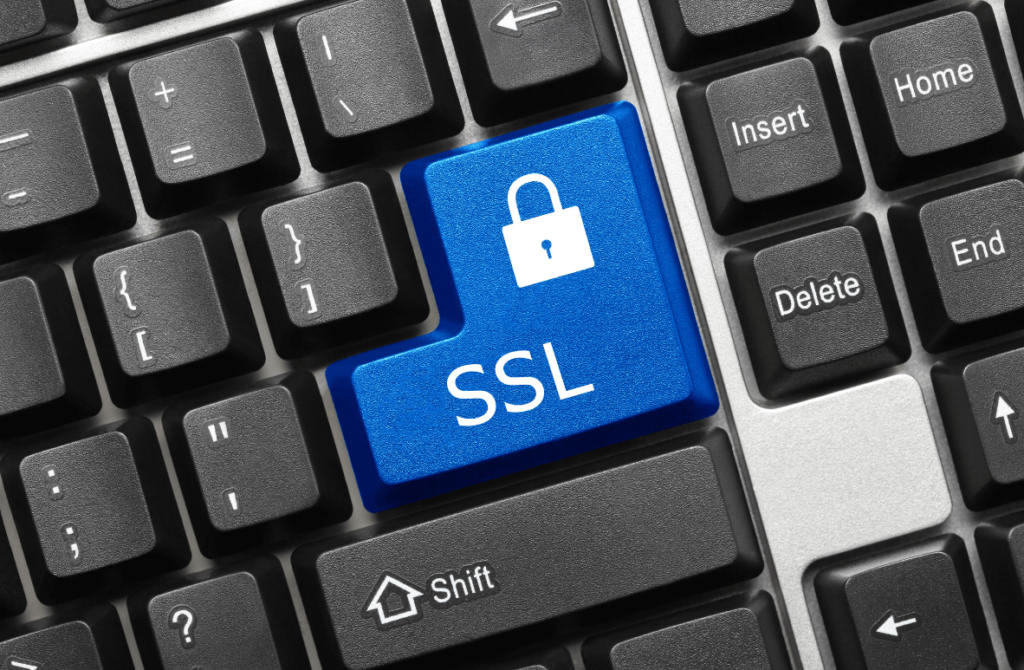An SSL certificate acts as a digital validation proving a website’s trustworthiness and enabling a safe, encrypted connection. SSL, which stands for Secure Sockets Layer, provides users with confidence in the security of their connection. Websites with an SSL certificate can be recognized by a padlock icon on the left side of the URL bar, and their website address begins with “HTTPS” rather than “HTTP”.
To procure an SSL certificate, the host of the web service must confirm ownership of the domain to the certificate authority during issuance. This is akin to enclosing a letter in an envelope before mailing it, ensuring a layer of security.
SSL certificates safeguard user information like credit card or Social Security numbers from cyber threats, underscoring the importance of using secure websites.
Purposes of SSL Certificates
Primarily, SSL certificates provide a secure conduit between a site visitor and the website, an essential feature for e-commerce sites or any pages requiring submission of personal or credit card data.
As e-commerce continues to surge, the need for website security is paramount for both users and webmasters. SSL encryption helps thwart hackers from gaining access to sensitive information, including credit card numbers, names, addresses, and medical records.
SSL Certificates: How Do They Function?
SSL certificates create an encrypted connection between a browser and a server, rendering the data unreadable without a decryption key. Here’s the process that unfolds within milliseconds:
- The user types in a secure website’s URL, starting with “HTTPS”.
- The user’s browser requests secure pages from the website’s server.
- The server sends a public key and its SSL certificate, both digitally signed by a third party, verifying the server’s identity.
- The user’s browser verifies the legitimacy of the digital signature.
- After verifying the certificate, the browser shows a padlock icon in the URL bar.
- The browser sends encrypted data and a secret key to the server.
- The server utilizes a private decryption key to read the data and access the secret key.
From here, the browser and server exchange data using the shared decryption key, making it unreadable to hackers without the key.
Different Types of SSL Certificates
SSL certificates are available in various types:
- Extended validation (EV) SSL certificate: Offers the highest level of security, essential for websites handling sensitive information. EV certificates need a neutral third-party certificate authority to perform an enhanced review of the applicant to instill user confidence.
- Organization validated (OV) SSL certificate: Best suited for public-facing websites dealing with less sensitive transactions, requiring the organization to validate domain ownership and confirm its legal registration.
- Domain validation (DV) certificate: Only verifies the site ownership and has the lowest trust level. It’s often exploited by cybercriminals due to its easy accessibility and can make a site appear safer than it actually is.
- Other SSL certificates like Unified communications (UCC) certificate, Single domain SSL certificate, and Wildcard SSL certificates refer to the number of domains registered under one certificate.
Identifying SSL Secured Websites
Identifying a site’s SSL certificate is crucial for online safety. Regardless of the certificate type, secure sites will display a padlock symbol and “HTTPS” in the URL bar.
Tips for Safe Online Sessions
To ensure your online safety, consider these steps:
- Read the seller’s privacy policy.
- Look for trust indicators on shopping sites.
- Understand the type of SSL certificate a website holds.
- Consider cybersecurity tools like antivirus software and VPNs.
- Recognize signs of unsafe websites such as flashing warnings, exclamation marks, and pop-ups.
As online shopping becomes the norm, understanding SSL certificates and online security measures can protect consumers from cybercrimes.
Frequently Asked Questions
What does SSL stand for?
SSL is an abbreviation for Secure Sockets Layer, a protocol designed to keep the data shared between a web server and a browser secure.
HTTP vs HTTPS: What’s the difference?
“HTTP” stands for Hypertext Transfer Protocol, and the added “s” in “HTTPS” stands for “secure,” indicating an encrypted connection enabled by an SSL certificate.
Can SSL certificates be used on multiple servers?
Yes, some SSL certificates can be used on multiple servers, but terms and conditions may vary based on the certificate issuer.
What happens when an SSL certificate expires?
The secure, encrypted communication between the browser and the server stops when an SSL certificate expires, leaving data in plaintext and susceptible to cyberattacks.
What does an SSL certificate include?
SSL certificates include information like domain name, certificate owner, issuance date, expiration date, and the public key.
What is the cost of an SSL certificate?
Prices vary, with an average SSL certificate costing about $60 annually, but it can range from $5 to $1,000 depending on security needs.
Can I get an SSL certificate for free?
Nonprofit CA organizations do offer free SSL certificates, but they may come with limitations.
